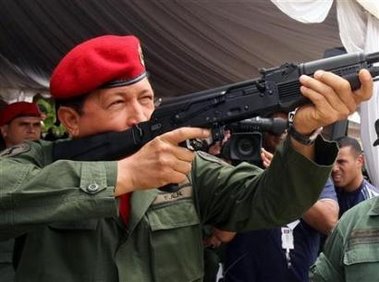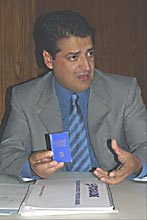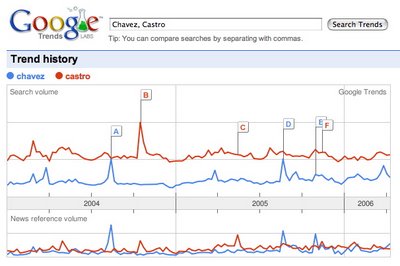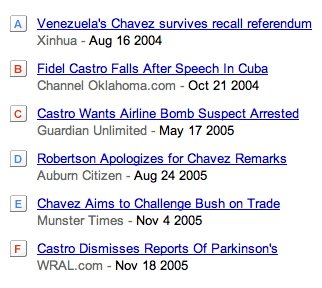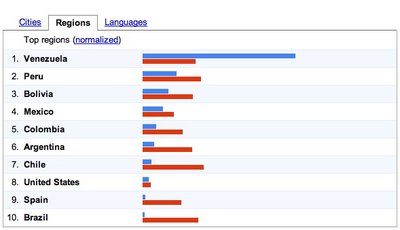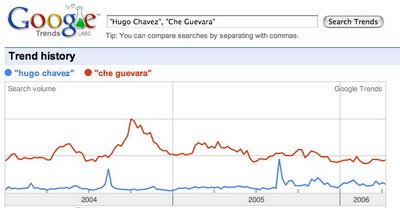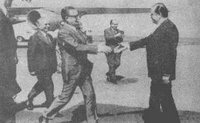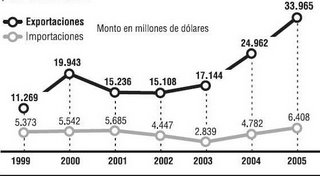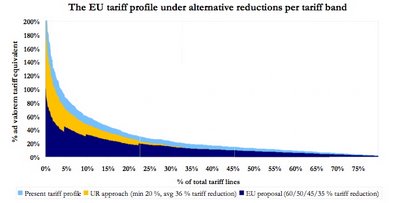(Incidentally, JCZ, buddy, you're a good analyst but BOY do you need an editor! You could knock out at least 20% of the words in this article without losing any content.)
Extracts:
What will Chavez do when the contradictions at the heart of the revolution burst into the open? Because they will burst, as they burst with Luis Miquilena, who Chavez called his father in private but in private, between confidants, linked to the past. The Chavista generals knew that the old man was an obstacle to Chavez's purposes, because Chavez knew that Miquilena didn't understand him, didn't agree or approve of talk of revolution or socialism or taking apart the capitalist system, or his siding with Fidel Castro. And so he was faced down by Chavismo's left wing and, in the end, with Chávez himself.
And as they burst with Luis Alfonso Dávila, a right wing military man who traveled the country with Chávez when he was just starting to build his political project, who would chair Congress and become foreign and interior minister. After Miquilena left he also faced the leftist wing of chavismo: he made a grab for control of MVR, was picked out by the movement's vultures, cornered and defeated.
The winners were Chávez and Diosdado Cabello, and their allies. In just a few years they cleansed the movement of outmoded right-wingers - like Davila and viceadmiral Gruber Odremán, and of groups with roots in the past - like those lead by Luis Miquilena and Tobías Carrero, among others. Having cleaned house, they have become lords and masters of the revolutión. But it's obvious that ideology still separates them. While Chávez fights capitalism, Diosdado Cabello cheers it and protects it.
There is no question: the contradictions will blow into the open again because what's a stake in Venezuela is a conception of the state, of the system. How far will the allies go along with Chávez in deepening an anti-capitalist revolution? How far will they back his constitutional changes to guarantee he can perpetuate himself in the presidency?
The Bolibourgeoisie, born of the Chavez era, might claim the spaces it has won at any time - including the space to make agreements with traditional and multinacional capitalists, because nothing is more pragmatic than capital.
Neither Juan Vicente Gómez nor Pérez Jiménez nor Rómulo Betancourt would hang out at the Caracas Country Club, but they understood their tacit pact with capital. Chávez doesn't go to the Country Club and, at the same time, wants to take apart a system for coexistence that has been in place since the Republic exists, since 1830, where, according to historian Ramón J. Velásquez, the generals rule, the learned make the laws and the rich do business. Since Gómez's time, no head of state had accumulated so much power - in fact, it may not be totally crazy to affirm that Chávez has accumulated more power than Gómez.
In 1998, when the business elite ended up backing Chávez, they thought that the 1830 pact would remain intact, that the partition of powers would continue. But the last few years shows that the regime's goal is not just to break the pact - which it has already done formally - but to go beyond that and to take apart the system that underlies the pact.
"The long term objective, in the economy, is to transcend the capitalist model," said Chávez on November 12, 2004 talking to a meeting of government officials. "The capitalist economic model is inviable, impossible. We, the leaders - especially the leaders - have to be very clear about that."
This is why Chavez lumps the entire business establishment together into just one big fascist, counter-revolutionary oligarchy. And so he has taken on the challenge to dominate it and destroy it if needs be.
And yet, while he says that for now "we are not considering getting rid of private property...at this time (2004) that would be crazy...it's not the right time," and at the same time he says "nobody knows what will happen in the future," a good part of the leadership that surrounds him has very different goals: to become the new big players in the business world, to take the spot of the Polar Group, the Cisneros Group, the bankers, etc. That's the deep divide in chavismo. The major contradiction that sooner or later will burst open within the movement. And Chávez knows it. Chávez suspects it. That's why he keeps talking about Juan Vicente Gómez's treachery against Cipriano Castro and he talks about Gómez's surrender to the Caracas oligarchy.
"We must think through the creation of a new economic system. We can't do that in two or five years, that would be a lie," says Chávez. Many who listen to him think of the utopian nature of the discourse, and rather than utopias they prefer to stuff their pockets.
And so after seven years of bolivarian revolution, power has become military-political domination. The Armed Forces' High Command, the Army Command and the MVR's National Tactical Command all respond to Chávez orders, as both political and military leader, and from their orders are handed on down to the military bureaucracy, which dominates not just the armed forces but also the key structures of the government and the state. The National Assembly, the Supreme Tribunal, the National Electoral Council, the Prosecutors, the Ombudsman and the Comptroller, all see their space for action reduced until they've become mere puppets in a system with a democratic facade.
The minority of the structure is powerful, and within that minority there is the president, who accepts no decentralized political decisions from governors, ministers, parlamentarians or heads of State-owned enterprises. When the finance minister, for instance, announces a decision, he has no problem saying that the decision has been made but the president has the last word, when pro-government candidates are selected for the National Assembly, the leaders have no problem admitting that the president has the last word; when Caracas Mayor Juan Barreto announces a plan, the publicity highlights the president's name; when a little square is opened in any town in Venezuela, the mayor unveils a little plaque saying the public work is due to Hugo Chavez.
These details reflect the domination of that autarkic power, which demands of its followers that they must repeat, again and again, "fatherland or death," "with Chavez unto death," and "Chavez is the people."
The military caudillo cannot accept doubts of any kind, and therefore demands total subservience, and if this stops happening that would be a dangerous signal of a crisis. It also explains why the caudillo prefers to set up a parallel state, to set up the bolivarian schools, the Bolivarian University, the adult education missions, and why he attacks private education and limits autonomous universities: to sow feelings of personal loyalty and loyalty to the revolution. It doesn't matter that the level at the Bolivarian University or Mision Sucre fall far short of quality standards. The problem isn't quality, it's loyalty. Loyalty is proof of love for the caudillo.
But then others say: my loyalty is money.


